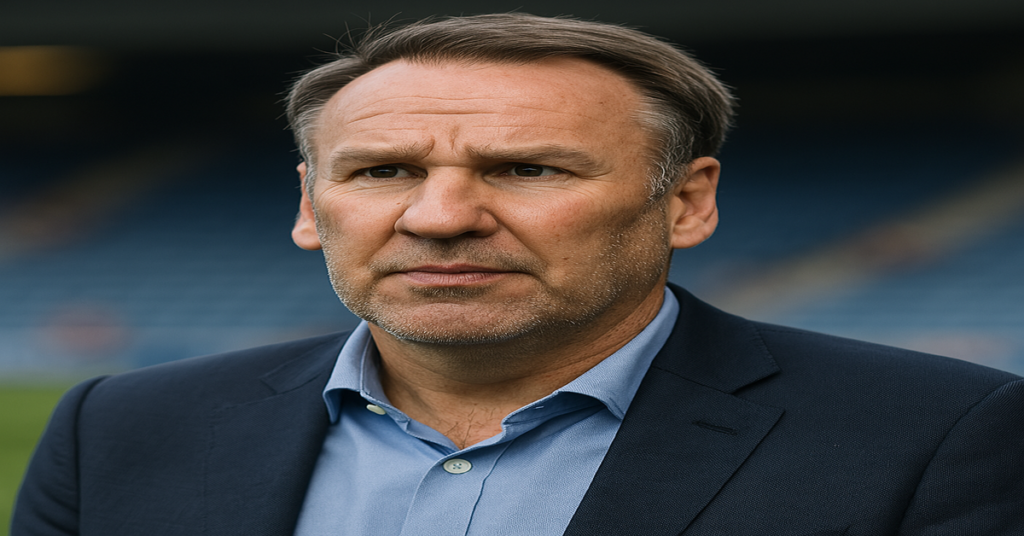Paul Merson is a name that echoes through English football history as a player of flair, resilience, and undeniable talent. Known for his creativity on the pitch and honesty off it, Merson’s story is one of triumph, adversity, and personal growth. A gifted midfielder with an eye for the spectacular, Merson played for clubs like Arsenal, Middlesbrough, and Aston Villa, and earned caps for the England national team. Today, he is a household name in sports media, widely recognized for his insightful – and sometimes emotional – commentary as a television pundit.
His life and career journey encapsulate the highs and lows of professional football, tackling addiction, recovery, and reinvention. This article explores Paul Merson’s legacy as a footballer, his battle with personal demons, and his impactful second act as a media personality.
Early Life and Football Beginnings
Childhood and Passion for Football
Born on March 20, 1968, in Harlesden, London, Paul Charles Merson grew up in a working-class family with a deep love for football. Raised in Northolt, West London, his early days were spent playing in the streets and local parks, where his passion for the sport quickly became apparent.
Like many aspiring footballers, Merson honed his skills in youth football. He joined Arsenal’s youth system at a young age and quickly progressed through the ranks.
Arsenal Academy and Development
Merson joined Arsenal as an apprentice in 1984. Under the guidance of the coaching staff at Highbury, he developed his technical abilities and tactical understanding. In 1986, he signed a professional contract with the club, beginning what would become an illustrious, albeit turbulent, footballing journey.
Arsenal FC: A Decade of Glory and Turmoil
Debut and Early Success
Paul Merson made his first-team debut for Arsenal in 1986 against Manchester City. Over the next few seasons, he became a key figure in George Graham’s side, known for his creativity, vision, and ability to score crucial goals.
The 1988–89 season was a highlight, as Merson contributed significantly to Arsenal’s dramatic league title win, secured by a last-minute goal at Anfield. He was named PFA Young Player of the Year in 1989.
Versatility on the Pitch
Merson’s playing style was unique. Although primarily an attacking midfielder, he often operated on the wing or as a second striker. His ability to read the game, deliver accurate passes, and strike from distance made him a constant threat.
His most notable attributes included:
- Exceptional vision and passing range
- Powerful and accurate shooting
- Ability to dribble past defenders
- High footballing IQ and positional awareness
Personal Struggles Surface
Despite his on-field success, Merson struggled with personal issues, including alcoholism, drug addiction, and gambling. In 1994, he publicly admitted to his battles with cocaine and alcohol, which shocked the football world. The FA supported his decision to enter rehab, and he took a three-month break to receive treatment.
This candid admission marked a pivotal point in his life, as he became one of the first footballers to openly discuss addiction.
Later Club Career
Middlesbrough and Leadership
In 1997, after 12 years with Arsenal, Merson signed for Middlesbrough. His arrival coincided with Boro’s ambition to return to the Premier League. Merson’s impact was immediate, helping the club earn promotion in the 1997–98 season.
His experience and leadership were vital to the team’s success. Despite being at the tail end of his career, he remained a creative force and a mentor to younger players.
Aston Villa and FA Cup Final
In 1998, Merson moved to Aston Villa, where he played under manager John Gregory. He continued to perform at a high level, helping Villa reach the FA Cup final in 2000, although they lost to Chelsea.
Merson’s time at Villa was marked by consistency and maturity, showing signs of a player who had grown both professionally and personally.
Final Years at Portsmouth and Walsall
After a stint with Portsmouth (where he helped them win promotion to the Premier League in 2002–03), Merson joined Walsall as player-manager. Although the team struggled, this period marked his transition into coaching and punditry.
England Career
Representing the Three Lions
Paul Merson earned 21 caps for the England national team, scoring 3 goals. He was part of the squads for:
- Euro 1992
- 1998 FIFA World Cup
Though never a permanent fixture in the starting XI, Merson’s technical ability and flair made him a valuable squad member. One of his most memorable moments came in a World Cup qualifier against Poland, where he scored a vital goal.
International Challenges
Competition for places was fierce during Merson’s international career, with players like Paul Gascoigne and David Platt often preferred. Still, his inclusion in two major tournaments reflected his quality and reputation.
Personal Battles and Recovery
Addiction and Mental Health
Merson’s openness about his struggles with addiction has been both brave and impactful. His issues began early in his playing career and worsened with fame and pressure. At different points, he battled:
- Cocaine addiction
- Alcohol dependency
- Gambling addiction (reportedly losing over £7 million)
These struggles affected not only his career but also his personal life, including multiple divorces and mental health issues.
Path to Recovery
After seeking professional help, Merson began his road to recovery. He has since become an advocate for mental health awareness and addiction support, often speaking publicly about the importance of seeking help.
His 2021 Sky Sports documentary “Paul Merson: Football, Gambling & Me” was widely praised for its honest exploration of his gambling addiction and its impact on his life.
Career as a Football Pundit
Sky Sports and Soccer Saturday
Post-retirement, Merson became a regular on Sky Sports’ Soccer Saturday, where his animated reactions and passionate opinions made him a fan favorite. His punditry is known for being:
- Honest and unfiltered
- Humorous and relatable
- Emotionally driven and insightful
He often covers Premier League fixtures and offers analysis on English football at all levels.
Writing and Commentary
In addition to TV work, Merson has written for newspapers and magazines, providing columns filled with his unique perspective as both a former player and a recovering addict.
His autobiography, “How Not to Be a Professional Footballer”, offers a deeper look at his journey, filled with stories of triumph, regret, and redemption.
Impact on Football Culture
Breaking the Stigma
Merson’s transparency about his mental health and addiction issues has helped destigmatize these topics within professional sport. He has encouraged others to come forward, setting a precedent for openness in a world where vulnerability is often hidden.
Role Model Through Honesty
Though flawed, Merson has become a role model for many—not through perfection, but through resilience and honesty. His ability to acknowledge mistakes and inspire change is one of his greatest legacies.
Life Outside Football
Family and Faith
Paul Merson is a father and family man. He has spoken openly about the importance of his children and the role they play in his continued recovery.
In recent years, he has also explored spirituality and found strength in faith, which he credits with helping maintain his sobriety.
Public Speaking and Advocacy
Merson is in demand as a public speaker, often invited to talk at schools, sports clubs, and recovery programs. His candid style and firsthand experience make him a powerful voice in discussions about addiction and mental health.
Conclusion
Paul Merson’s story is one of exceptional talent, personal turmoil, and profound transformation. From dazzling crowds at Highbury to offering heartfelt insights on live television, Merson has lived a life full of highs and lows.
His footballing ability was never in question — a player capable of changing games with a single touch. But it’s perhaps his openness, vulnerability, and relentless pursuit of self-betterment that has left the deepest mark on fans and fellow professionals alike.
As a player, pundit, and person, Paul Merson continues to educate, entertain, and inspire.
FAQs
1. How many clubs did Paul Merson play for?
Paul Merson played for several clubs, including Arsenal, Middlesbrough, Aston Villa, Portsmouth, and Walsall.
2. Did Paul Merson play for England?
Yes, he earned 21 caps for the England national team and played in Euro 1992 and the 1998 World Cup.
3. What addictions did Paul Merson struggle with?
Merson struggled with alcoholism, cocaine addiction, and gambling, the latter costing him millions over his career.
4. Is Paul Merson still involved in football?
Yes, he is a prominent pundit on Sky Sports and frequently writes columns and appears in documentaries.
5. What is Paul Merson’s most famous book?
His autobiography, “How Not to Be a Professional Footballer”, is highly regarded for its honesty and depth.
6. Has Paul Merson fully recovered from his addictions?
While Merson has been sober for periods and remains active in recovery, he has admitted that managing addiction is a lifelong journey.







